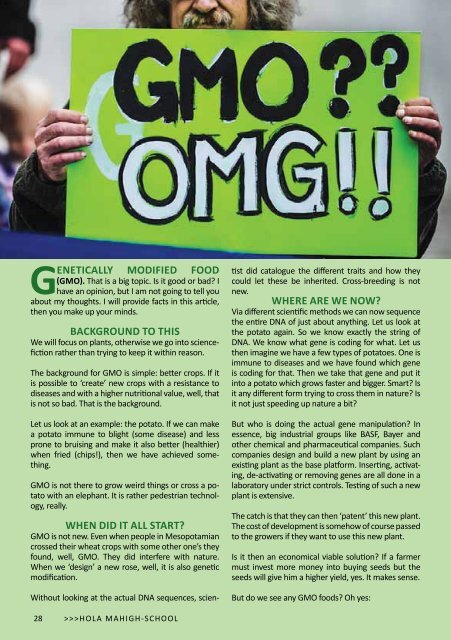Open-Day – get there!
Create successful ePaper yourself
Turn your PDF publications into a flip-book with our unique Google optimized e-Paper software.
Science<br />
Genetically modified food<br />
(GMO). That is a big topic. Is it good or bad? I<br />
have an opinion, but I am not going to tell you<br />
about my thoughts. I will provide facts in this article,<br />
then you make up your minds.<br />
Background to this<br />
We will focus on plants, otherwise we go into sciencefiction<br />
rather than trying to keep it within reason.<br />
The background for GMO is simple: better crops. If it<br />
is possible to ‘create’ new crops with a resistance to<br />
diseases and with a higher nutritional value, well, that<br />
is not so bad. That is the background.<br />
Let us look at an example: the potato. If we can make<br />
a potato immune to blight (some disease) and less<br />
prone to bruising and make it also better (healthier)<br />
when fried (chips!), then we have achieved something.<br />
GMO is not <strong>there</strong> to grow weird things or cross a potato<br />
with an elephant. It is rather pedestrian technology,<br />
really.<br />
When did it all start?<br />
GMO is not new. Even when people in Mesopotamian<br />
crossed their wheat crops with some other one’s they<br />
found, well, GMO. They did interfere with nature.<br />
When we ‘design’ a new rose, well, it is also genetic<br />
modification.<br />
Without looking at the actual DNA sequences, scientist<br />
did catalogue the different traits and how they<br />
could let these be inherited. Cross-breeding is not<br />
new.<br />
Where are we now?<br />
Via different scientific methods we can now sequence<br />
the entire DNA of just about anything. Let us look at<br />
the potato again. So we know exactly the string of<br />
DNA. We know what gene is coding for what. Let us<br />
then imagine we have a few types of potatoes. One is<br />
immune to diseases and we have found which gene<br />
is coding for that. Then we take that gene and put it<br />
into a potato which grows faster and bigger. Smart? Is<br />
it any different form trying to cross them in nature? Is<br />
it not just speeding up nature a bit?<br />
But who is doing the actual gene manipulation? In<br />
essence, big industrial groups like BASF, Bayer and<br />
other chemical and pharmaceutical companies. Such<br />
companies design and build a new plant by using an<br />
existing plant as the base platform. Inserting, activating,<br />
de-activating or removing genes are all done in a<br />
laboratory under strict controls. Testing of such a new<br />
plant is extensive.<br />
The catch is that they can then ‘patent’ this new plant.<br />
The cost of development is somehow of course passed<br />
to the growers if they want to use this new plant.<br />
Is it then an economical viable solution? If a farmer<br />
must invest more money into buying seeds but the<br />
seeds will give him a higher yield, yes. It makes sense.<br />
But do we see any GMO foods? Oh yes:<br />
28 >>>HOLA MAHIGH-SCHOOL
















